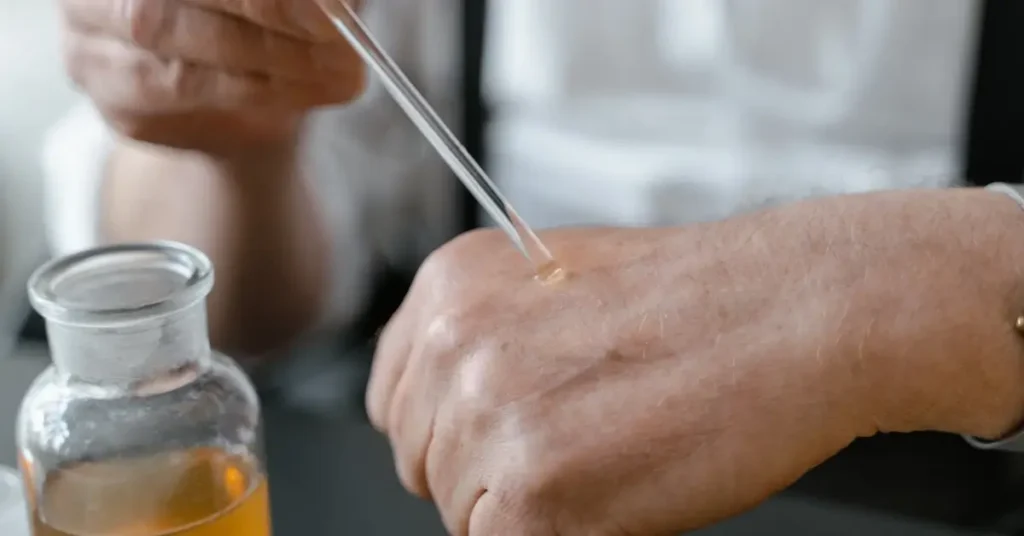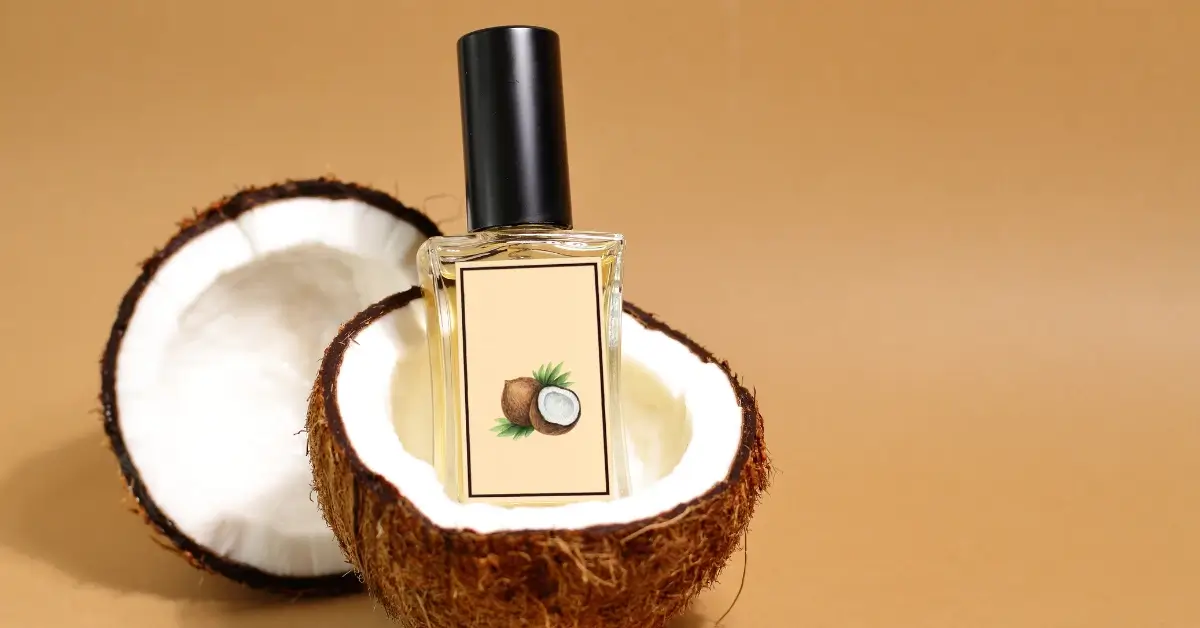Each day, we apply it directly to our skin, but can it guarantee our long-term health? Can it ward off diseases? All these questions will be answered in this article. Continue reading to learn more!
“Are Fragrances toxic?” Definition and Chemical Composition
When we consider the question “are fragrances toxic” understanding what they are made of is fundamental.
Understanding Fragrances
Fragrances are complex mixtures designed to give products a distinctive scent. Typically, these aromatic formulations are found in a range of consumer products, from perfumes and colognes to household cleaners and air fresheners. The term “fragrance” can represent a blend of several ingredients intended to produce a specific aroma profile.
Key Ingredients
A fragrance’s ingredient list may encompass natural extracts from plants, flowers, and essential oils as well as synthetic components. Synthetic ingredients are often preferred in commercial fragrances for their consistency and longevity. However, some components, such as phthalates, can be controversial due to health concerns linked to their use.
Synthetic vs Natural Fragrances
In the debate on whether are fragrances toxic, a distinction is often made between synthetic and natural fragrances. Natural fragrances typically utilize compounds extracted from natural sources and are perceived as safer by some consumers. In contrast, synthetic fragrances can contain man-made chemicals, some of which have been identified as potentially harmful. However, the presence of synthetic ingredients does not automatically classify a fragrance as toxic. Each ingredient’s safety profile depends on its chemical structure, usage levels, and manner of exposure.
Health Considerations

When we consider whether are fragrances toxic, we must examine the potential health impacts carefully. They range from immediate effects often noticeable right after exposure, to more insidious long-term effects that may not be immediately obvious, as well as the potential for allergic reactions in some individuals.
Short-Term Effects
- Respiratory Issues: Fragrances often contain volatile organic compounds (VOCs) which can cause immediate reactions such as migraines or respiratory difficulties in about 35% of people.
- Skin Reactions: Contact with some fragrances can lead to skin irritation, including rashes or hives.
- Neurological Symptoms: In some cases, exposure can result in symptoms like drowsiness, confusion, and dizziness.
Long-Term Effects
- Endocrine Disruption: Certain chemicals in fragrances may interfere with hormone systems, potentially leading to long-term health issues.
- Chronic Health Conditions: Prolonged exposure to fragrance ingredients may contribute to chronic conditions, although conclusive long-term studies are still needed.
Allergic Reactions
- Contact Dermatitis: Fragrances are among the most common causes of allergic contact dermatitis, an itchy skin condition.
- Chemical Sensitivity: Workers and individuals with chemical sensitivities may experience adverse reactions, indicating that fragrances may not be suitable for all environments.
Consumer Awareness and Safety
When discussing whether are fragrances toxic, we need to be well-informed about the products we use daily. Ensuring consumer safety starts with transparency and making better choices based on reliable information.
Labeling and Transparency
Most of us come into contact with fragranced products regularly, but we’re often unaware of their potential impact on our health due to a lack of clear labeling. According to a study published on NCBI, emissions from fragranced consumer products can be a primary source of indoor air pollutants. Currently, manufacturers are not required to disclose all ingredients in fragrances, posing a challenge for consumers who want to stay informed. Here’s what to look for:
- Full Ingredient Disclosure: Check for products that list all ingredients, including individual fragrance components.
- Certifications and Seals: Look for endorsements from credible organizations that signify adherence to stricter safety standards.
Choosing Safe Fragrances

Making safer choices requires a bit of research and understanding of which products have fewer risks associated with them. Take note that some “unscented” products may still contain fragrances to mask chemical odors. For individuals with sensitivities, the American Academy of Dermatology advises avoidance of fragranced products altogether. Consider these tips:
- Go Natural: Opt for products made with essential oils and natural extracts.
- Patch Test: Always perform a patch test with a new product to check for any adverse skin reactions.
Myths and Misconceptions
When it comes to the question of whether are fragrances toxic, it is also important that we cover and clarify the common myths.
Myth 1: Perfumes are inherently dangerous. While it is true that some fragrances contain chemicals of concern, not all fragrances are harmful. The dosage and context of usage often determine the risk.
Myth 2: Natural fragrances are always safe. Just because a fragrance is natural does not guarantee it is safe for everyone. Some individuals may have allergies or sensitivities to natural oils and extracts.
Myth 3: Fragrances are gendered. The idea that perfumes are for women and colognes are for men is outdated. Fragrance is a personal choice and not defined by gender. If you like a fragrance, then let’s go for it, don’t let anyone tell you what to do!
Myth 4: Higher concentration means better quality. People often believe that Eau de Parfum (EDP) is superior to Eau de Toilette (EDT), but this isn’t necessarily the case. EDPs have a higher concentration, but EDTs can be preferable for their lighter, more refreshing scent.
Myth 5: All chemicals are bad. It is a misconception that all synthetic ingredients are harmful. Many are rigorously tested for safety and can be more sustainable than their natural counterparts.
FAQ
As we explore the question “are fragrances toxic,” it’s vital to address common concerns with direct, science-backed insights. Here, we answer top frequently asked questions about the safety of perfumes and other scented products.
Is inhaling perfume toxic?
Inhaling perfume can be irritating to some individuals, especially those with asthma or allergies. Perfumes can sometimes contain volatile organic compounds (VOCs), which may have harmful effects when inhaled in significant quantities over time. However, the level of exposure from typical perfume use is generally considered low.
Are fragrances carcinogens?
Fragrances can contain chemicals that have been linked to cancer in some studies. For instance, certain synthetic musks and phthalates have been under scrutiny. However, the evidence does not conclusively determine that fragrances act as direct carcinogens in humans at the levels typically found in consumer products.
Do fragrances lower testosterone?
Some research indicates that certain components in fragrances, like phthalates, may have endocrine-disrupting properties which could potentially affect testosterone levels. That said, the evidence is not conclusive, and the impact of fragrances on testosterone requires further study to understand any significant health implications.
If you liked this blog post about the topic: Are Fragrances Toxic? don’t forget to leave us a comment down below to tell us about your experience with it.





